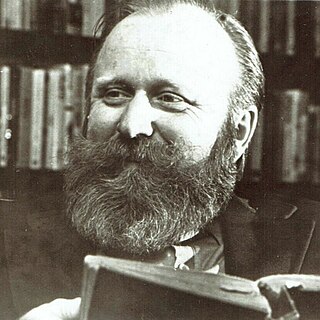
Franklin Patrick Herbert Jr. was an American science-fiction author, best known for his 1965 novel Dune and its five sequels. He also wrote short stories and worked as a newspaper journalist, photographer, book reviewer, ecological consultant, and lecturer.

Herbert George Wells was an English writer, prolific in many genres. He wrote more than fifty novels and dozens of short stories. His non-fiction output included works of social commentary, politics, history, popular science, satire, biography, and autobiography. Wells' science fiction novels are so well regarded that he has been called the "father of science fiction".

Poul William Anderson was an American fantasy and science fiction author who was active from the 1940s until his death in 2001. Anderson also wrote historical novels. He won the Hugo Award seven times and the Nebula Award three times, and was nominated many more times for awards.

Starship Troopers is a military science fiction novel by American writer Robert A. Heinlein. Written in a few weeks in reaction to the US suspending nuclear tests, the story was first published as a two-part serial in The Magazine of Fantasy & Science Fiction as Starship Soldier, and published as a book by G. P. Putnam's Sons on November 5, 1959.
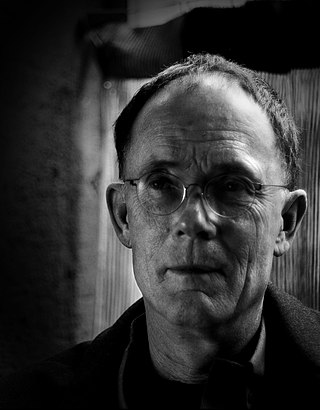
William Ford Gibson is an American-Canadian speculative fiction writer and essayist widely credited with pioneering the science fiction subgenre known as cyberpunk. Beginning his writing career in the late 1970s, his early works were noir, near-future stories that explored the effects of technology, cybernetics, and computer networks on humans, a "combination of lowlife and high tech"—and helped to create an iconography for the Information Age before the ubiquity of the Internet in the 1990s. Gibson coined the term "cyberspace" for "widespread, interconnected digital technology" in his short story "Burning Chrome" (1982), and later popularized the concept in his acclaimed debut novel Neuromancer (1984). These early works of Gibson's have been credited with "renovating" science fiction literature in the 1980s.

Gregory Dale Bear was an American writer and illustrator best known for science fiction. His work covered themes of galactic conflict, parallel universes, consciousness and cultural practices, and accelerated evolution. His last work was the 2021 novel The Unfinished Land. Greg Bear wrote over 50 books in total.

Gene Rodman Wolfe was an American science fiction and fantasy writer. He was noted for his dense, allusive prose as well as the strong influence of his Catholic faith. He was a prolific short story writer and novelist, and won many literary awards. Wolfe has been called "the Melville of science fiction", and was honored as a Grand Master by the Science Fiction and Fantasy Writers of America.
This article contains information about the literary events and publications of 1931.
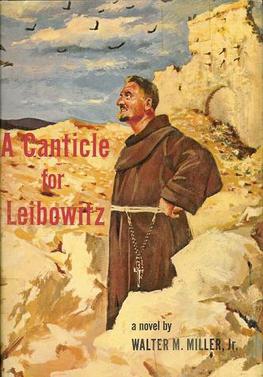
A Canticle for Leibowitz is a post-apocalyptic social science fiction novel by American writer Walter M. Miller Jr., first published in 1959. Set in a Catholic monastery in the desert of the southwestern United States after a devastating nuclear war, the book spans thousands of years as civilization rebuilds itself. The monks of the Albertian Order of Leibowitz preserve the surviving remnants of man's scientific knowledge until the world is again ready for it.
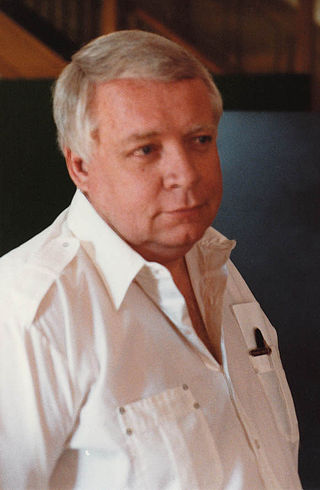
Algirdas Jonas "Algis" Budrys was a Lithuanian-American science fiction author, editor, and critic. He was also known under the pen names Frank Mason, Alger Rome in collaboration with Jerome Bixby, John A. Sentry, William Scarff, and Paul Janvier. In 1960, he authored Rogue Moon, a novel.
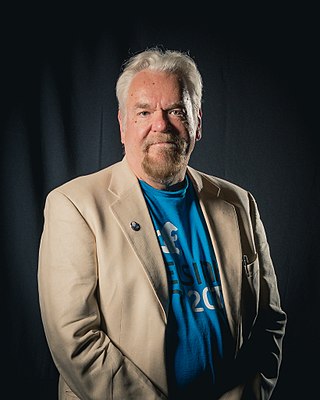
Walter Jon Williams is an American writer, primarily of science fiction. Previously he wrote nautical adventure fiction under the name Jon Williams, in particular, Privateers and Gentlemen (1981–1984), a series of historical novels set during the Age of Sail.

Gardner Raymond Dozois was an American science fiction author and editor. He was the founding editor of The Year's Best Science Fiction anthologies (1984–2018) and was editor of Asimov's Science Fiction magazine (1986–2004), garnering multiple Hugo and Locus Awards for those works almost every year. He also won the Nebula Award for Best Short Story twice. He was inducted to the Science Fiction Hall of Fame on June 25, 2011.

Joe William Haldeman is an American science fiction author.
Stanley Albert Schmidt is an American science fiction author and editor. Between 1978 and 2012 he served as editor of Analog Science Fiction and Fact magazine.

Danish literature stretches back to the Middle Ages. The earliest preserved texts from Denmark are runic inscriptions on memorial stones and other objects, some of which contain short poems in alliterative verse. In the late 12th century Saxo Grammaticus wrote Gesta Danorum. During the 16th century, the Lutheran Reformation came to Denmark. During this era, Christiern Pedersen translated the New Testament into Danish and Thomas Kingo composed hymns. Fine poetry was created in the early 17th century by Anders Arrebo (1587–1637). The challenges faced during Denmark's absolute monarchy in 1660 are chronicled in Jammersminde by Leonora Christina of the Blue Tower. Ludvig Holberg (1684–1754), influenced by the ideas of the Enlightenment and Humanism, is considered the founder of modern Danish and Norwegian literature. Neoclassical poetry, drama, and the essay flourished during the 18th century influenced by French and English trends. German influence is seen in the verse of the leading poets of the late 18th century such as Johannes Ewald and Jens Baggesen. Other 18th century writers include the hymn writer Hans Adolph Brorson and the satirical poet Johan Herman Wessel.

Klaus Rifbjerg was a Danish writer. He authored more than 170 novels, books and essays. In 1965 he co-produced the film 4x4 which was entered into the 4th Moscow International Film Festival.
Steven T. Murray (1943–2018) was an American translator from Swedish, German, Danish, and Norwegian. He worked under the pseudonyms Reg Keeland and McKinley Burnett when edited into UK English. He translated the bestselling Millennium series by Stieg Larsson, three crime novels and two African novels by Henning Mankell, three psychological suspense novels by Karin Alvtegen, and works by many other authors. In 2001 he won the Gold Dagger Award in the UK for his translation of Sidetracked by Henning Mankell.

A Nomad of the Time Streams is a compilation volume of Michael Moorcock's early steampunk trilogy, begun in 1971 with The Warlord of the Air and continued by its 1974 and 1981 sequels, The Land Leviathan and The Steel Tsar. The trilogy follows the adventures of Edwardian-era British Army Captain Oswald Bastable in alternate versions of the 20th century.

The Last Sentence is a 2012 Swedish film, directed by Jan Troell and starring Jesper Christensen, Pernilla August, Björn Granath and Ulla Skoog. It is set between 1933 and 1945, and focuses on the life and career of Torgny Segerstedt, a Swedish newspaper editor who was a prominent critic of Hitler and the Nazis during a period when the Swedish government and monarch were intent on maintaining Sweden's neutrality and avoiding tensions with Germany. The film also deals with Segerstedt's relations with his wife, his mistress, and his mistress's husband.
The Holberg Medal is an award to a Danish author of fiction or writer on science. It is an appreciation of a literary or scientific work or of the award winner's authorship as a whole. The prize is often awarded on 3 December, the birthday of Ludvig Holberg. The first award was given in 1934 in connection with the 40th anniversary of the Danish association of authors.
















